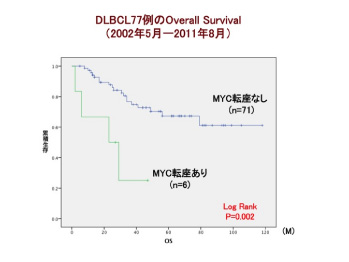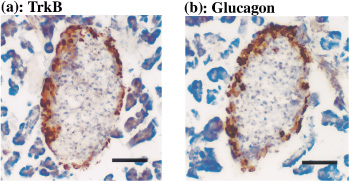1.Research Summary
The Department of Hematology, Endocrinology, and Metabolism is divided into the Endocrinology and Metabolism Group and the Hematology Group. Highly technical research is conducted in both areas. With the two groups working cooperatively we cover a wide range of disorders, from lifestyle-related diseases to tumors, in internal medicine.
2.Research Groups
3-1.Endocrinology and Metabolism GroupEndocrinology and Metabolism Group
Research subjects
Clinical epidemiology of lifestyle-related diseases, including diabetes
mellitus, dyslipidemia, and obesity
Predictors for lifestyle-related diseases, including diabetes mellitus,
in health check-up recipients
Mechanism of anti-diabetic action of new anti-diabetic candidate BDNF
Development of new anti-diabetic agents focusing on nuclear receptor regulation
Measurement of AGEs and investigation of their association with complications
in diabetic patients
Treatment of periodontitis and kinetics of adipocytokines in diabetic patients
Analysis of autoregulation of renal blood flow in diabetes mellitus
3-2.Hematology Group
Research subjects
Pathological analysis of hematopoietic tumors
Treatment of chronic myelogenous leukemia
Analysis of prognostic factors in malignant lymphoma
Development of new therapies for refractory malignant lymphoma
Development of appropriate therapies using new drugs for myeloma
Allogeneic immunity and antitumor immunity in hematopoietic stem cell transplantation
Basic research on hematopoietic environment and hematopoietic stem cells,
and the pathogenesis of hematopoietic tumors
Development of new hematopoietic stem cell transplantation techniques for
refractory hematopoietic tumors
4.Research Results
[Area] Endocrinology and metabolism
[Research subject]
Clinical epidemiology of lifestyle-related diseases, including diabetes mellitus, dyslipidemia, and obesity
[DescriptionDescription]
Metabolic and endocrine diseases, such as diabetes mellitus, hyperlipidemia,
hypertension, gout, obesity and excessive thinness, metabolic syndrome,
and osteoporosis, have become epidemic and have become a threat to people’s
health and lives in developed countries, including Japan, in recent years.
To overcome such metabolic and endocrine diseases, or so-called lifestyle-related
diseases, prophylaxis, diagnosis, and treatment must be performed based
on the results (clinical evidence and large-scale epidemiologic data) of
studies analyzing science-based data, in particular clinical data (including
medical examination data) in a large group. The aim of this subject is
to establish evidence facilitating the prophylaxis and treatment of metabolic
and endocrine, or lifestyle-related, diseases through clinical research,
epidemiologic studies, and clinical data analysis to contribute to the
health and longevity of people worldwide. Particularly, we place the greatest
importance on lifestyle habits, such as diet and exercise, and provide
instructions in both of these areas. We believe interdisciplinary fusion
of medicine or internal medicine, and general medical sciences (e.g., nutritional
science, biomechanics, sports medicine, health science, and statistics),
instead of investigations in the former field alone, to also be important
for achieving our goal. We have already established a large body of evidence
published in highly-regarded and peer-reviewed foreign medical journals.
Our findings have proven to be useful in the clinical setting and for the
preparation of guidelines.
[Area] Hematology
[Research subject]
Prognostic factors for diffuse large B-cell lymphoma
[Description]
For diffuse large B-cell lymphoma (DLBCL), R-CHOP therapy is regarded as
the standard treatment, but there is known to be a group of treatment-refractory
patients with poor outcomes. Using FISH analysis, we discovered that approximately
10% of DLBCL patients have translocations in the MYC gene region which
portends a very poor prognosis (figure in right). We reported similar results
in as many as 100 patients by conducting collaborative research with Tokai
University and the University of Tsukuba (Leuk Lymphoma. 2013;54:2149).
We are currently investigating an effective therapy for this group.
[Photographs]

[Area] Hematology
[Research subject]
Treatment of chronic myelogenous leukemia with tyrosine kinase inhibitors
[Description]
Tyrosine kinase inhibitors significantly changed the treatment of chronic
myelogenous leukemia and set a precedent for molecular targeted therapy
for malignant tumors. Molecular targeted drugs require specific management
of adverse reactions and efficacy evaluation in the clinical setting as
they have mechanisms of action different from those of conventional anticancer
agents. We have been analyzing the clinical effect of imatinib against
chronic myelogenous leukemia by conducting collaborative research with
relevant hospitals.
Based on our analysis, we reported a significantly better prognosis in
patients with an early mass reduction of at least 3 logs as confirmed by
quantitative PCR or the FISH method 18 months after the initiation of treatment
(Int J Hematol. 2011;93:336). In addition, in collaboration with Akita
University, we discovered that blood imatinib concentrations are involved
in the 3-log reduction (Clin Pharmacol Ther. 2010 88:809). Based on long-term
clinical follow-up, we further reported that blood imatinib concentrations
also affect the tolerability of long-term treatment (ASH meeting. 2012.
Dec). We are also investigating cell biological factors that influence
therapeutic effects.
[Area] Endocrinology and metabolism
[Research subject]
Mechanism of anti-diabetic action of new anti-diabetic candidate BDNF
[Description]
Amid a significant worldwide increase in diabetic patients, there are considerable
numbers of patients whose blood glucose cannot be well controlled with
instructions on lifestyle modifications or conventional medications, and
novel anti-diabetics with new mechanisms of action are needed. We have
reported that brain-derived neurotrophic factors (BDNFs) exert inhibitory
effects on the secretion of glucagon from pancreatic alpha cells, in addition
to suppressing appetite. BDNFs have also been reported to exert increasing
effects on basal metabolism and are highly anticipated future anti-diabetic
agents.
[Photographs]
[Expression of BDNF receptor TrkB in mouse pancreatic alpha cells]

